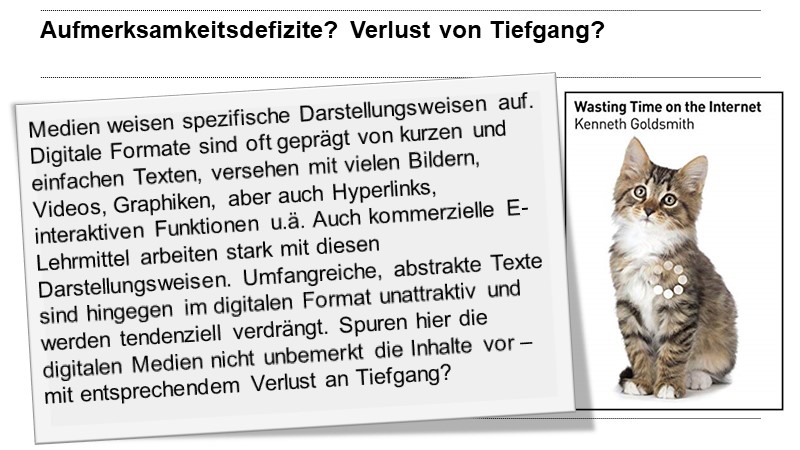Wasting Time on the Internet |

|
 Diese Seite wurde seit 1 Jahr inhaltlich nicht mehr aktualisiert.
Unter Umständen ist sie nicht mehr aktuell.
Diese Seite wurde seit 1 Jahr inhaltlich nicht mehr aktualisiert.
Unter Umständen ist sie nicht mehr aktuell.
 Zusammenfassungen
Zusammenfassungen
Der Kunstkritiker Kenneth Goldsmith hat in seinem Buch «How to waste time on the internet» die Idee formuliert, dass die Menschen heute nicht weniger konzentriert seien als vor fünfzig Jahren – und er plädiert dafür, dass wir Konzentration grundsätzlich neu denken: nicht als kontemplatives Dasitzen am Schreibtisch, sondern als gleichzeitiges Jonglieren von zig Informationen. Er meint also, dass auch in der Zerstreutheit des Webs – dem Scannen, Sharen und Chatten – eine Art Konzentration liegt.
Von Nina Kunz im Text #ichhassediesesinternet (2019)  Using clear, readable prose, conceptual artist and poet Kenneth Goldsmith’s manifesto shows how our time on the internet is not really wasted but is quite productive and creative as he puts the experience in its proper theoretical and philosophical context.
Using clear, readable prose, conceptual artist and poet Kenneth Goldsmith’s manifesto shows how our time on the internet is not really wasted but is quite productive and creative as he puts the experience in its proper theoretical and philosophical context.
Kenneth Goldsmith wants you to rethink the internet. Many people feel guilty after spending hours watching cat videos or clicking link after link after link. But Goldsmith sees that “wasted” time differently. Unlike old media, the internet demands active engagement—and it’s actually making us more social, more creative, even more productive.
When Goldsmith, a renowned conceptual artist and poet, introduced a class at the University of Pennsylvania called “Wasting Time on the Internet”, he nearly broke the internet. The New Yorker, the Atlantic, the Washington Post, Slate, Vice, Time, CNN, the Telegraph, and many more, ran articles expressing their shock, dismay, and, ultimately, their curiosity. Goldsmith’s ideas struck a nerve, because they are brilliantly subversive—and endlessly shareable.
In Wasting Time on the Internet, Goldsmith expands upon his provocative insights, contending that our digital lives are remaking human experience. When we’re “wasting time,” we’re actually creating a culture of collaboration. We’re reading and writing more—and quite differently. And we’re turning concepts of authority and authenticity upside-down. The internet puts us in a state between deep focus and subconscious flow, a state that Goldsmith argues is ideal for creativity. Where that creativity takes us will be one of the stories of the twenty-first century
 Dieses Buch erwähnt ...
Dieses Buch erwähnt ...
 Personen KB IB clear | Ann M. Blair , Marshall McLuhan | |||||||||||||||||||||||||||
 Aussagen KB IB clear | Behauptung 54: Internet macht einsam.
ICT fördert Oberflächlichkeit | |||||||||||||||||||||||||||
 Begriffe KB IB clear |  Apple Watch
, Apple Watch
,  dark data
, digital detox
, dark data
, digital detox
,  Digitalisierung
, Digitalisierung
,  Fernsehen Fernsehen television
, television
,  Internet Internet internet
, internet
,  Kreativität Kreativität creativity
, kulturelles Kapital
, creativity
, kulturelles Kapital
,  Phishing
, Wearable ComputingWearable Computing Phishing
, Wearable ComputingWearable Computing
| |||||||||||||||||||||||||||
 Bücher |
|
 Tagcloud
Tagcloud
 Vorträge von Beat mit Bezug
Vorträge von Beat mit Bezug
 Zitationsgraph
Zitationsgraph
 Zitationsgraph (Beta-Test mit vis.js)
Zitationsgraph (Beta-Test mit vis.js)
 4 Erwähnungen
4 Erwähnungen 
- Kultur der Digitalität (Felix Stalder) (2016)


- How To Be a Geek - Essays on the Culture of Software (Matthew Fuller) (2017)

- 4.0 oder Die Lücke die der Rechner lässt (Dirk Baecker) (2018)

- #ichhassediesesinternet - Über die Angst, sein Leben online zu vergeuden. (Nina Kunz) (2019)


 Co-zitierte Bücher
Co-zitierte Bücher
 Volltext dieses Dokuments
Volltext dieses Dokuments
 Standorte
Standorte 
 Bibliographisches
Bibliographisches 
 Beat und dieses Buch
Beat und dieses Buch
Beat hat dieses Buch während seiner Zeit am Institut für Medien und Schule (IMS) ins Biblionetz aufgenommen. Beat besitzt kein physisches, aber ein digitales Exemplar. (das er aber aus Urheberrechtsgründen nicht einfach weitergeben darf). Es gibt bisher nur wenige Objekte im Biblionetz, die dieses Werk zitieren. Beat hat dieses Buch auch schon in Vorträgen erwähnt.















 Biblionetz-History
Biblionetz-History